#identity
Link
In today’s new Longreads essay, Montserrat Andrée Carty writes about family and identity, growing up around different languages and cultures, and eventually embracing (and loving) her name over time.
We seek to become the truest version of ourselves, but what if there isn’t one true version, but multiple? Like father, like daughter, there are two versions of me.
At 5, I spoke all these languages fluently. Today, I only speak two of them, but understand all of them in some way, as they still live inside me.
Read her beautiful personal essay on Longreads.
284 notes
·
View notes
Text
#furry oc#mutant mayhem#kasane teto#anime moodboard#prompt list#pixel#identity#Nygmobblepot#jackson#pixar
124 notes
·
View notes
Text
Regulus Black would listen to grandson. No I do not take criticism
#regulus black#incorrect marauders quotes#gay dead wizards#identity#the marauders#dead gay wizards#harry potter#the pantheon#slytherin#slytherin skittles#rab#bury me face down#darkside#ww111#in over my head#heat seeker#grandson
21 notes
·
View notes
Text
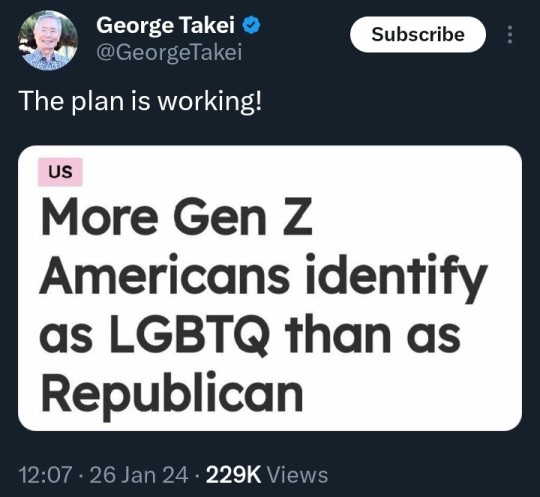

#Gen Z#Generation Z#LGBTQ#LGBT#LGBTQIA#SAGA#equality#same-sex#marriage#gay#lesbian#transgender#asexual#bisexual#pansexual#gender#identity#human#civil#rights#hope#Republican#Republicans#George Takei
9K notes
·
View notes
Text
We ask your questions so you don’t have to! Submit your questions to have them posted anonymously as polls.
#polls#incognito polls#anonymous#tumblr polls#tumblr users#questions#polls about lgbtq stuff#submitted dec 12#orientation#identity
3K notes
·
View notes
Text
I actually don't think that the high percentage of autistic people who are trans/nonbinary has anything to do with how autistic brains work, and I think insisting that it does is a dangerous path to go down.
Rather, I think it has a lot more to do with the fact that people who are already othered in some way are more likely to question aspects of themselves and their identities than people who aren't othered.
Autistic people, and really, all neurodivergent people, are already the Other. Whether diagnosed or not, autistic people already feel different and already wonder why they're different. You can say the same about any Othered demographic. A cishet, white, able-bodied person in the US is less likely to question deeply how they feel because being of the normative class, they just assume others feel the exact same way as them (even if it's not the case).
Think about how many seemingly cishet people say things that make us as non-cishet folks tilt our head a bit, when they say things like "everyone is a little bi, doesn't mean you're gay" or "everyone's felt like a different gender, doesn't mean you're trans", because obviously not everyone actually feels that way and maybe these people could benefit from a bit more introspection, but they never considered it because they assumed everyone felt that way because everything else about their identity- whiteness, abledness, income- is considered The Norm.
So, an autistic person who already has felt different and othered their whole life, who has already been constantly questioning themself, is more likely to also question their sexuality and/or gender identity because they don't really have anything to lose and are already questioning anyway. Meanwhile, a neurotypical person with the same unaddressed feelings about their gender and/or sexuality is more likely not to address those feelings because they either think they're unremarkable or because they fear the repercussions of suddenly Not Being The Norm.
It's not that autistic brains are more wired to not be cishet, it's that autistic people, by being the Other, are just going to be more open to questioning their identity because their identity is already in question by everyone around them.
6K notes
·
View notes
Text

2024 IS NOT FOR "PLAY PLAY" .
#new year#leveling up#philosophy#self identity#identity#spiritual alignment#spiritual disciplines#positive vibrations#vibrational energy#resilience#spiritual awakening#high maintenance#thoughts#high value mindset#growth mindset#wisdom#gentillmatic#black girl moodboard#masculine energy
2K notes
·
View notes
Text
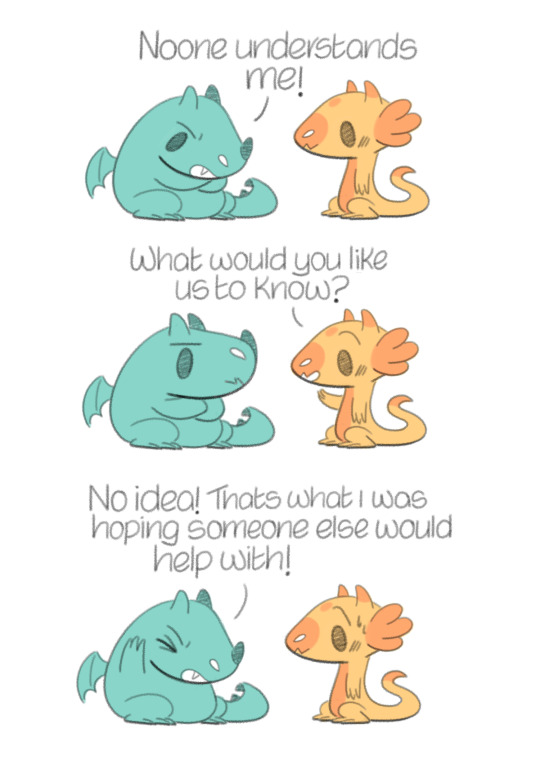
Double bind
1K notes
·
View notes
Text
shout out to people who have complicated/complex genders
shout out to people who are genderless
shout out to people who don't use/have labels to describe their gender
shout out to people who are still questioning their gender
#gender stuff#gender identity#genders#gender#identity#pride#queer#lgbtq#lgbtqia+#lgbtq+ community#lgbt community#lgbtqiap#lgbt pride#lgbtq rights#lgbt#transgender#trans#trans community#lgbt positivity#lgbt representation#lgbt stuff#lgbt+#lgbta#lgbtpeople#lgbtpride#lgbtq community#lgbtq positivity#lgbtq pride#lgbtq representation#lgbtq+
3K notes
·
View notes
Text
"You shouldn't teach teens aro and ace identities! What is they start identifying as ace instead of gay!"
Ah yes, how terrible indeed would it be for a teenagers to experiment with their identity
We all know that who we decide we are at 13 is who we end up being for our entire lives, regardless if it is authentic to our present selves
#queer#lgbtq+#gay#ace#aro#asexual#aromantic#aroace#lesbian#bi#community#questioning#experimenting#identity
2K notes
·
View notes
Text
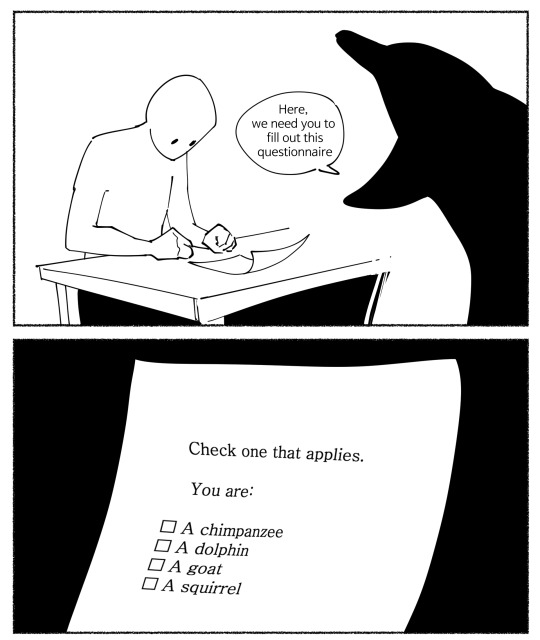
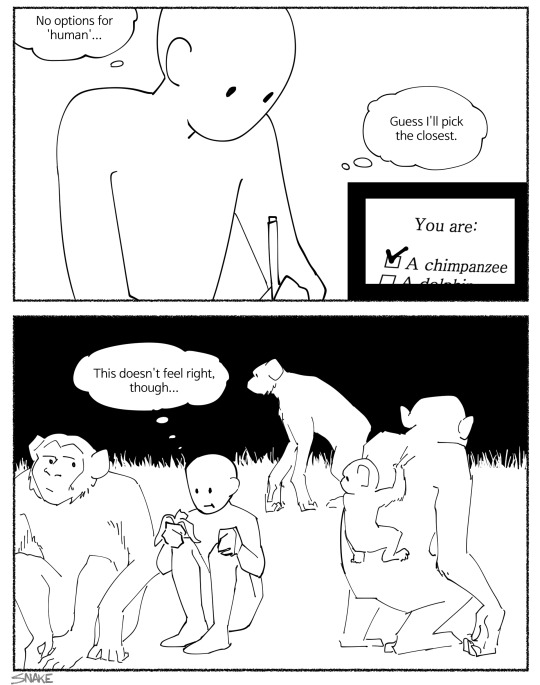
As far as society is concerned, you are a chimpanzee.
#original art#doodle#comic#identity#sense of self#chimpanzee#human#artists on tumblr#Sorry I'm bad at drawing apes#snake's art#Recently been wondering if I'm nonbinary or agender or something like that#So those concepts are relevant I guess
3K notes
·
View notes
Text

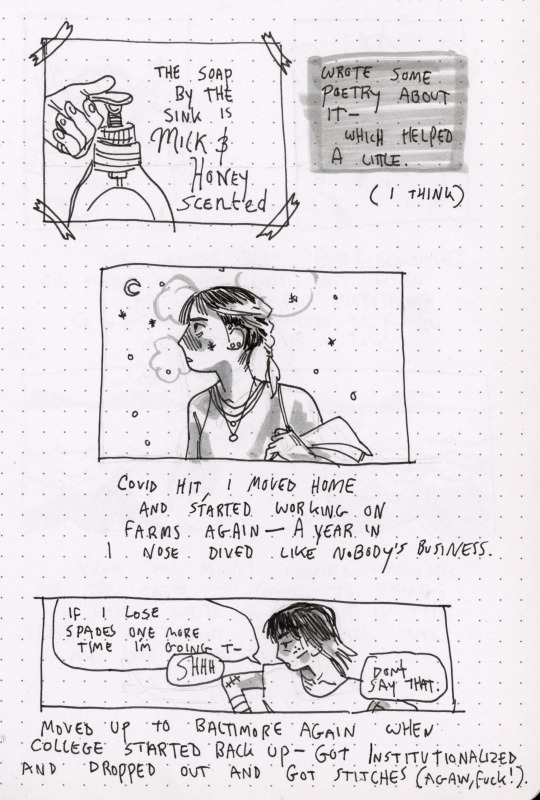




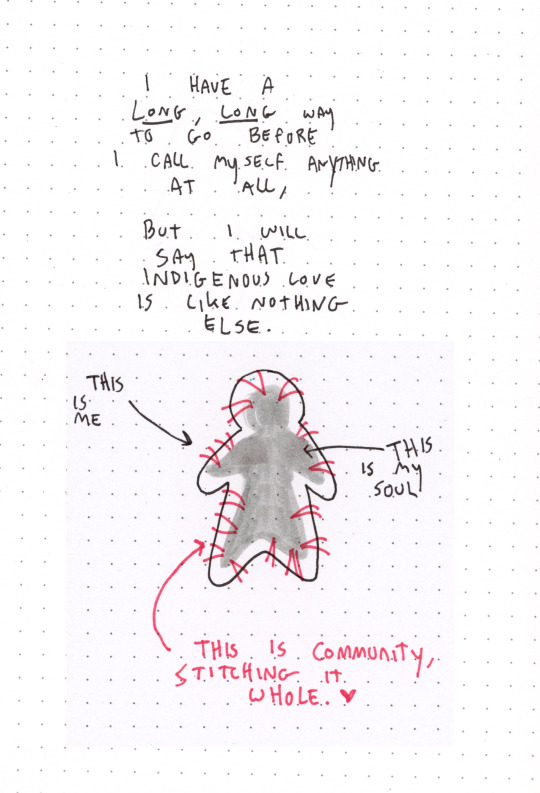
I'll keep writing about life until life stays in me
#art#my art#comic#visual poetry#traditional art#identity#mental health#reflection#healing#cw sh mention#words#diary#journal
1K notes
·
View notes
Text
Sri Lankan Fairies and Senegalese Goddesses: Mixing Mythology as a Mixed Creator
[Note: this archive ask was submitted before the Masterpost rules took effect in 2023. The ask has been abridged for clarity.]
@reydjarinkenobi asked:
Hi, I’m half Sri Lankan/half white Australian, second gen immigrant though my mum moved when she was a kid.
My main character for my story is a mixed demigod/fae. [...] Her bio mum is essentially a Scottish/Sri Lankan fairy and her other bio mum (goddess) is a goddess of my own creation, Nettamaar, who’s name is derived from [...] Wolof words [...]. The community of mages that she presided over is from the South Eastern region of Senegal [...] In the beginning years of European imperialism, the goddess basically protected them through magic and by blessing a set of triplets effectively cutting them off from the outside world for a few centuries [...]
I was unable to find a goddess that fit the story I wanted to tell [...] and also couldn’t find much information on the internet for local gods, which is why I have created my own. I know that the gods in Hinduism do sort of fit into [the story] but my Sri Lankan side is Christian and I don’t feel comfortable representing the Hindu gods in the way that I will be this goddess [...]. I wanted to know if any aspect of the community’s history is problematic as well as if I should continue looking further to try and find an African deity that matched my narrative needs?
I was also worried that having a mixed main character who’s specifically half black would present problems as I can’t truly understand the black experience. I plan on getting mixed and black sensitivity readers once I finish my drafts [...] I do take jabs at white supremacy and imperialism and I I am planning to reflect my feelings of growing up not immersed in your own culture and feeling overwhelmed with what you don’t know when you get older [...].
I’m sorry for the long ask but I don’t really have anyone to talk to about writing and I’m quite worried about my story coming across as insensitive or problematic because of cultural history that I am not educated enough in.
Reconciliation Requires Research
First off: how close is this world’s history to our own, omitting the magic? If you’re aiming for it to be essentially parallel, I would keep in mind that Senegal was affected by the spread of Islam before the Europeans arrived, and most people there are Muslim, albeit with Wolof and other influences.
About your Scottish/Sri Lankan fairy character: I’ll point you to this previous post on Magical humanoid worldbuilding, Desi fairies as well as this previous post on Characterization for South Asian-coded characters for some of our commentary on South Asian ‘fae’. Since she is also Scottish, the concept can tie back to the Celtic ideas of the fae.
However, reconciliation of both sides of her background can be tricky. Do you plan on including specific Sri Lankan mythos into her heritage? I would tread carefully with it, if you plan to do so. Not every polytheistic culture will have similar analogues that you can pull from.
To put it plainly, if you’re worried about not knowing enough of the cultural histories, seek out people who have those backgrounds and talk to them about it. Do your research thoroughly: find resources that come from those cultures and read carefully about the mythos that you plan to incorporate. Look for specificity when you reach out to sensitivity readers and try to find sources that go beyond a surface-level analysis of the cultures you’re looking to portray.
~ Abhaya
I see you are drawing on Gaelic lore for your storytelling. Abhaya has given you good links to discussions we’ve had at WWC and the potential blindspots in assuming, relative to monotheistic religions like Christianity, that all polytheistic and pluralistic lore is similar to Gaelic folklore. Fae are one kind of folklore. There are many others. Consider:
Is it compatible? Are Fae compatible with the Senegalese folklore you are utilizing?
Is it specific? What ethnic/religious groups in Senegal are you drawing from?
Is it suitable? Are there more appropriate cultures for the type of lore you wish to create?
Remember, Senegalese is a national designation, not an ethnic one, and certainly not a designation that will inform you with respect to religious traditions. But more importantly:
...Research Requires Reconciliation
My question is why choose Senegal when your own heritage offers so much room for exploration? This isn’t to say I believe a half Sri-Lankan person shouldn’t utilize Senegalese folklore in their coding or vice-versa, but, to put it bluntly, you don’t seem very comfortable with your heritage. Religions can change, but not everything cultural changes when this happens. I think your relationship with your mother’s side’s culture offers valuable insight to how to tackle the above, and I’ll explain why.
I myself am biracial and bicultural, and I had to know a lot about my own background before I was confident using other cultures in my writing. I had to understand my own identity—what elements from my background I wished to prioritize and what I wished to jettison. Only then was I able to think about how my work would resonate with a person from the relevant background, what to be mindful of, and where my blindspots would interfere.
I echo Abhaya’s recommendation for much, much more research, but also include my own personal recommendation for greater self-exploration. I strongly believe the better one knows oneself, the better they can create. It is presumptuous for me to assume, but your ask’s phrasing, the outlined plot and its themes all convey a lack of confidence in your mixed identity that may interfere with confidence when researching and world-building. I’m not saying give up on this story, but if anxiety on respectful representation is a large barrier for you at the moment, this story may be a good candidate for a personal project to keep to yourself until you feel more ready.
(See similar asker concerns here: Running Commentary: What is “ok to do” in Mixed-Culture Supernatural Fiction, here: Representing Biracial Black South American Experiences and here: Am I fetishizing my Japanese character?)
- Marika.
Start More Freely with Easy Mode
Question: Why not make a complete high-fantasy universe, with no need of establishing clear real-world parallels in the text? It gives you plenty of leg room to incorporate pluralistic, multicultural mythos + folklore into the same story without excessive sweating about historically accurate worldbuilding.
It's not a *foolproof* method; even subtly coded multicultural fantasy societies like Avatar or the Grishaverse exhibit certain harmful tropes. I also don't know if you are aiming for low vs high fantasy, or the degree of your reliance on real world culture / religion / identity cues.
But don't you think it's far easier for this fantasy project to not have the additional burden of historical accuracy in the worldbuilding? Not only because I agree with Mod Marika that perhaps you seem hesitant about the identity aspect, but because your WIP idea can include themes of othering and cultural belonging (and yes, even jabs at supremacist institutions) in an original fantasy universe too. I don't think I would mind if I saw a couple of cultural markers of a Mughal Era India-inspired society without getting a full rundown of their agricultural practices, social conventions and tax systems, lol.
Mod Abhaya has provided a few good resources about what *not* to do when drawing heavily from cultural coding. With that at hand, I don't think your project should be a problem if you simply make it an alternate universe like Etheria (She-Ra and the Princesses of Power), Inys (The Priory of the Orange Tree) or Earthsea (the Earthsea series, Ursula K. Le Guin). Mind you, we can trace the analogues to each universe, but there is a lot of freedom to maneuver as you wish when incorporating identities in original fantasy. And of course, multiple sensitivity readers are a must! Wishing you the best for the project.
- Mod Mimi
#asks#multiracial#multicultural#south asian#sri lankan#senegalese#west african#identity#representation#worldbuilding#fantasy#mythology#folklore#fairies#deities#adoption#identity issues#mixed experiences#coding
528 notes
·
View notes
Text
Labels listed in these options are meant as examples, not a comprehensive list. Please choose the answer that you feel best fits you, and feel free to elaborate in the tags.
–
We ask your questions so you don’t have to! Submit your questions to have them posted anonymously as polls.
#polls#incognito polls#anonymous#tumblr polls#tumblr users#questions#polls about lgbtq stuff#lgbtq#lgbtq community#lgbtqia#queer#labels#identity#submitted nov 11
2K notes
·
View notes
Text
positionality vs identity
making this post in response to circulating claims about "transmasc privilege" and a noticeable gap in some of y'alls understanding of oppression.
positionality can be thought of as the way society perceives and treats you, and what privileges you are afforded accordingly.
identity can be thought of as your internal sense of self.
for most people, the two do not line up perfectly. your positionality depends on what people immediately see, not what you tell them. your positionality may also vary day to day based on a number of factors including but not limited to the people you are surrounded by, the space you are in, and the positionalities and identities of those perceiving you.
privilege is based almost entirely on positionality, not identity.
a good example is the diversity within the transgender community. if you take three transgender men at different stages in their transition they will each have a different positionality. one may have the positionality of a gender conforming cisgender man, the second may have the positionality of a transgender man, the third may have the positionality of a gender conforming cisgender woman. the gendered privileges these three people are afforded are vastly different despite all three of them having an identical gender identity.
if you have the positionality of a certain marginalized group, you will be targeted with the same oppression as them whether or not you share an identity with them. the fact that you don't share the identity doesn't suddenly make that oppression go away. you can be oppressed based on a positionality that does not align with your identity.
if you have questions on positionality vs identity i urge you to reply to this post instead of ignoring the gap in your knowledge.
#positionality#identity#positionality vs identity#trans#trans community#transmasc privilege#transfem#transgender#discourse mention#important#oppression#activism#transandrophobia
832 notes
·
View notes
Text
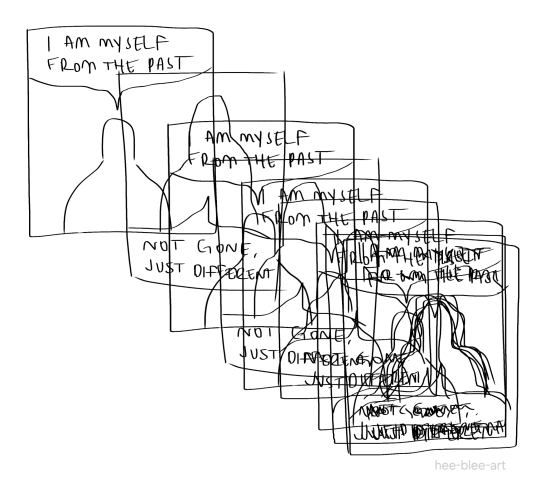
450 notes
·
View notes